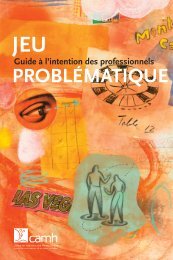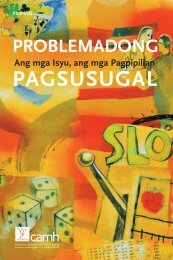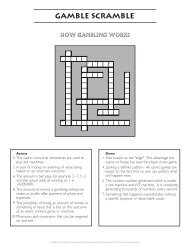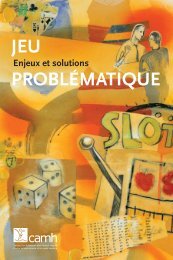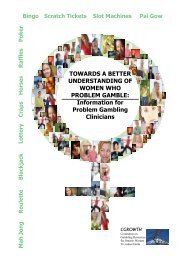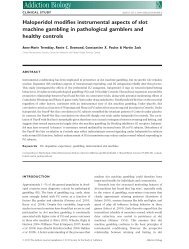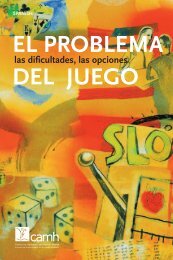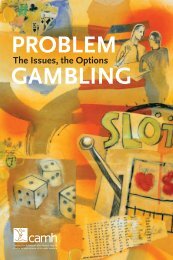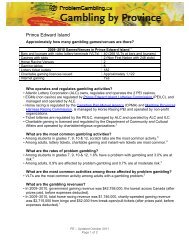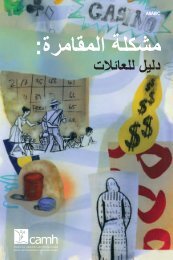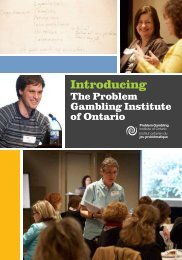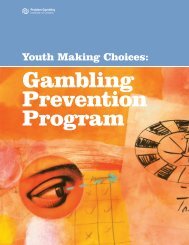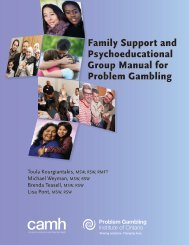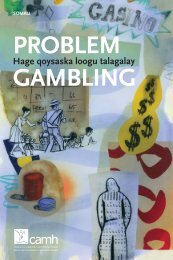Probability, Random Events, and the Mathematics of Gambling
Probability, Random Events, and the Mathematics of Gambling
Probability, Random Events, and the Mathematics of Gambling
You also want an ePaper? Increase the reach of your titles
YUMPU automatically turns print PDFs into web optimized ePapers that Google loves.
that one can beat <strong>the</strong> odds (Turner et al., 2002). Fur<strong>the</strong>rmore, it is argued that prevention<br />
requires disseminating accurate information about <strong>the</strong> reality <strong>of</strong> gambling <strong>and</strong> <strong>the</strong> way <strong>the</strong>se<br />
games can fool individuals into believing <strong>the</strong>y can win. A second goal <strong>of</strong> this chapter is to demystify<br />
r<strong>and</strong>om events.<br />
The following parts <strong>of</strong> this chapter:<br />
• provide a list <strong>of</strong> some <strong>of</strong> <strong>the</strong> more common misconceptions that people who gamble have<br />
about <strong>the</strong> nature <strong>of</strong> r<strong>and</strong>om chance;<br />
• give definitions <strong>and</strong> examples <strong>of</strong> probability, odds <strong>and</strong> o<strong>the</strong>r key concepts related to<br />
r<strong>and</strong>om chance;<br />
• examine, from a <strong>the</strong>oretical point <strong>of</strong> view, how a mechanistic universe filled with cause<strong>and</strong>-effect<br />
relationships can produce r<strong>and</strong>om events;<br />
• describe how specific types <strong>of</strong> games produce r<strong>and</strong>om events, including how slot<br />
machines work; <strong>and</strong><br />
• discuss <strong>the</strong> origins <strong>of</strong> some erroneous beliefs.<br />
Erroneous Beliefs<br />
People hold a number <strong>of</strong> misconceptions about <strong>the</strong> nature <strong>of</strong> r<strong>and</strong>om events. Many <strong>of</strong> <strong>the</strong>se<br />
misconceptions are due to <strong>the</strong> nature <strong>of</strong> r<strong>and</strong>om events <strong>and</strong> to misunderst<strong>and</strong>ings about <strong>the</strong><br />
words used to describe <strong>the</strong> phenomenon. Table 1 summarized <strong>the</strong>se misunderst<strong>and</strong>ings. The<br />
first column lists a number <strong>of</strong> <strong>the</strong> common misconceptions, or “naive concepts,” that<br />
individuals with a gambling problem may express concerning r<strong>and</strong>om events. The second<br />
column provides a series <strong>of</strong> statements that describe <strong>the</strong> true nature <strong>of</strong> <strong>the</strong>se events. The<br />
subsequent few pages provide resource information on probability, odds <strong>and</strong> r<strong>and</strong>omness to<br />
help <strong>the</strong> <strong>the</strong>rapist underst<strong>and</strong> <strong>the</strong> difference between <strong>the</strong> naive concept <strong>of</strong> r<strong>and</strong>omness <strong>and</strong> <strong>the</strong><br />
actual nature <strong>of</strong> r<strong>and</strong>om events.<br />
Table 1. <strong>R<strong>and</strong>om</strong> events: Naive concepts vs. actual nature<br />
Naive Concept <strong>of</strong> <strong>R<strong>and</strong>om</strong> <strong>Events</strong> Actual Nature <strong>of</strong> <strong>R<strong>and</strong>om</strong> <strong>Events</strong><br />
<strong>Events</strong> are consistently erratic. <strong>Events</strong> are just plain erratic (fundamental<br />
uncertainty). <strong>R<strong>and</strong>om</strong> events are <strong>of</strong>ten<br />
described as “clumpy” because clumps <strong>of</strong> wins<br />
or losses sometimes occur.<br />
Things even out. Things do not have to even out, but sometimes<br />
seem to, as more observations are added (law <strong>of</strong><br />
large numbers).<br />
If a number hasn’t come up, it’s due. If heads<br />
has occurred too <strong>of</strong>ten, tails is due.<br />
Numbers that haven’t come up are never due to<br />
come up. Coins <strong>and</strong> dice have no memories<br />
(independence <strong>of</strong> events).<br />
4



